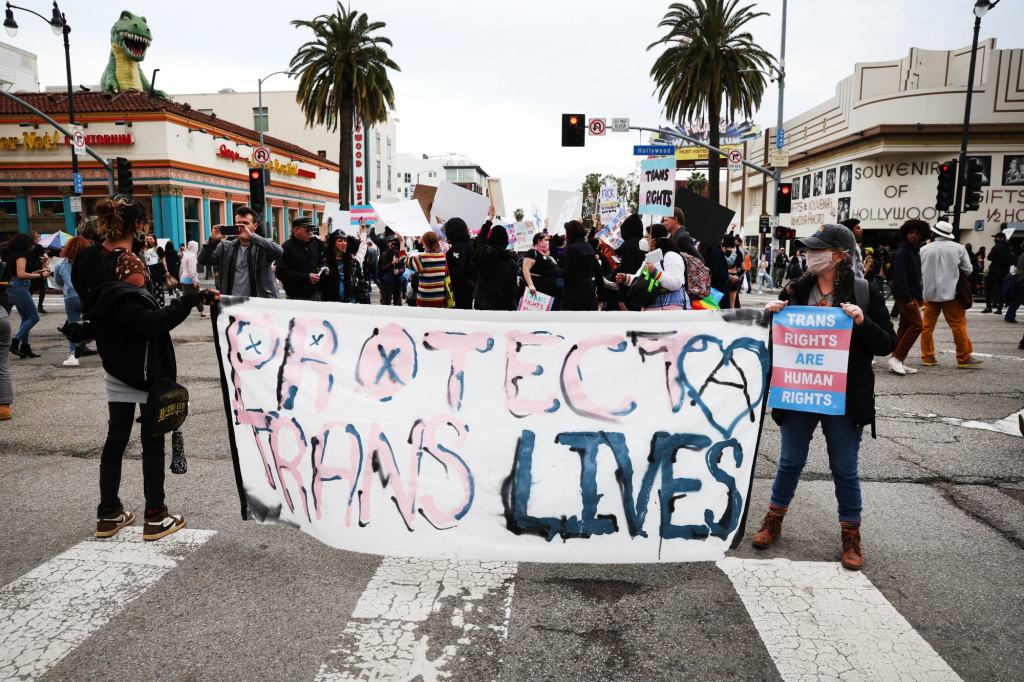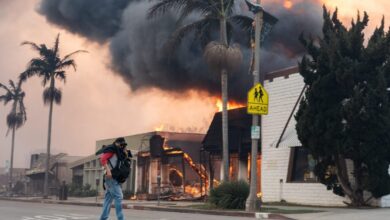‘Visibility isn’t enough,’ Southern California activists say at march for transgender rights – San Gabriel Valley Tribune

A wave of anti-transgender legislation sweeping the country prompted queer activists and allies to organize “Trans Day of Vengeance,” a protest during the nationally recognized Trans Day of Visibility on Friday, March 31.
“Transphobia has got to go!” activists yelled, waving flags and signs while marching down Hollywood Boulevard, as honking cars drove by.
With growing attacks and discriminatory legislation on the rise, at least 200 activists on Friday marched to demand safety and equality for this community, especially vulnerable trans and queer youth — many of whom are targeted in recent bills.
The march in Hollywood coincided with Trans Day of Visibility events, from the Inland Empire to the coastal L.A. area and in Orange County.
Marliese Hegele found Friday’s Hollywood event through TikTok, where queer content creators had been promoting local, state and national protests.
“I just wanted to show support for my community. I mean, there’s hundreds of anti-trans legislation bills being proposed, even in states that you would think would be safe,” Hegele said. “And then there’s actually ones that are horrific that are going through and being passed. And it’s very, it’s very terrifying.”
The march began on the corner of Highland and Hollywood in Los Angeles. Securing the crowd were community members who wore all-black garb, blocking their faces. Their goal was to secure the protesters, keeping an eye out for violent opposition.
While there were some police present, the community-led security helped protect the identity of protesters, especially youth, by blocking onlookers with cameras with signage and umbrellas.
Leading up to Friday’s demonstration, President Joe Biden officially recognized the movement in a proclamation on Thursday, March 30. California lawmakers also recognized as Trans Visibility Week with several events at the Capitol.
A self-proclaimed “craftivist” named KoKo handed out self-protection items that she made of resin.
“The cops aren’t here to keep us safe… they’re not gonna stand here and make sure that we’re not being attacked,” she said at the march. “Trans people are not people to be terrified of.”
In 2022, the majority of transgender and gender non-conforming people killed were transgender women, the Human Rights Campaign reported. Transgender people of color accounted for the majority of victims, over 76%, with Black transgender people accounting for a plurality (19, or over 56%).
Ronnie DeVreux had tears in his eyes, watching his husband Thaddeus join the crowd of organizers in the street. Both are trans.
“All my cis(gender) friends, all my cis workers, everyone, are completely in bliss,” he said. “They’re not aware of anything that’s going on. They don’t know how much pain I’m in.”
Trans Day of Visibility was first established in 2009 by trans activist Rachel Crandall-Crocker, the current head of advocacy group Transgender Michigan. Since its creation more than a decade ago, nationwide events have grown in popularity to honor the death of trans activists, celebrate the lives of trans folks, and raise awareness of ongoing violence and discrimination.
The “Trans Day of Vengeance” moniker came from a meme that had been in the trans community for years. Activists say it is a “more radical” take on the same circumstances: one that is highly critical of pacifism towards state terrorism, hatred towards transgender people and respectability politics.
Ahead of the national event, Twitter removed more than 5,000 tweets and retweets of a poster promoting the Washington D.C. “Trans Day of Vengeance” rally staged Friday, which was later canceled due to safety concerns for those involved.
In a tweet, Ella Irwin, Twitter’s head of Trust and Safety, cited that the poster’s verbiage “incites violence.” But on its website, organizers said it does not condone violence, and in a statement strongly rejected any connection between the March 27 shooting at a school in Nashville and the planned protest.
“Vengeance means fighting back with vehemence,” the D.C. protest’s organizers wrote. “We are fighting against false narratives, criminalization, and eradication of our existence.”
According to a 2023 online tracker, there are 489 anti-trans bills in 47 states. As of this report, 421 are active, 25 have passed and 43 have failed. In 2022, 15% or 26 bills of the 174 bills proposed were passed, most of which target trans and queer youth.
The bills targets range from restriction from access of gender-affirming care and safety, such as bathroom bills, to drag show bans and trans athlete bans.
“We refuse to live in fear. We refuse to be eradicated,” stated the rally’s call to action posted on a queer activist Instagram.
The term “eradication” was used by a far right Daily Wire commentator, Michael Knowles, during a Conservative Political Action Committee gathering in early March. Knowles has previously stated that genocide against transgender people is not possible because “they are not a legitimate category of being.”
The transgender community has always been threatened with violence, but activists predict that the onslaught of anti-trans legislation perpetuates violence.
On Friday, other community events recognizing Trans Day of Visibility were held in downtown Riverside, Long Beach, Pomona and Santa Ana.
Pomona’s march, which was organized by the Pomona Pride Center, went from the center to Pomona City Hall.
Frank Guzman, the groups’ president and executive director, said that while LGBTQ+ Californians are “a little more lucky” than residents of some other states, the recent surge in anti-LGBTQ+ sentiments was hitting closer to home.
“It opens a door for more to come,” he said. “And so we need to be prepared, and need to fight it right off the bat.”
Long Beach resident Zo Woodard came to the resource fair held at the city’s Bixby Park.
“I feel like some places don’t have things like these and it feels like a safe space,” Woodard said.
But while many celebrated and gathered, others who marched want their message to be heard loud and clear: that “trans rights are human rights.”
Bri Sérráno, an adjunct faculty in ethnic and women studies at Cal Poly Pomona, said that this latest wave of anti-transgender legislation will bring more queer people to seek safety in parts of the West — including in California.
Sérráno added that, much like with the matter of women’s reproductive rights, these safe “havens” must make strong, concerted efforts to increase protections for gender-affirming care for children and adults alike.
“This (anti-trans legislation) is going to ban trans children from becoming adults,” they said. “It really perpetuates the notion that anything that exists outside of white, cisgender straightness should therefore be eliminated, and not allowed to exist in public. A concept at the detriment of children when, meanwhile, there are still guns killing children and people killing children with guns.”
Staff writers Christina Merino, Roxana Kopetman, Kristy Hutchings and Sarah Hofmann contributed to this report.













